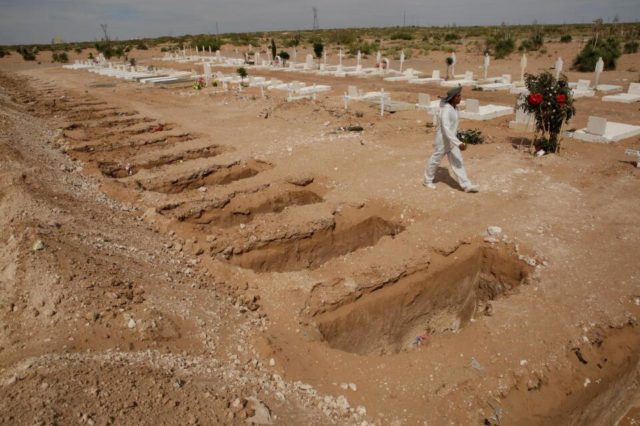The health minister in new regulations issued on Monday said that district and metropolitan municipalities should identify land that can be used for mass burial should a need arise.
WHILE Health Minister Zweli Mkhize has directed municipalities to identify land for mass burials should a need arise, the Sol Plaatje Municipality has not yet done so.
This is according to municipal spokesperson Sello Matsie, who said on Tuesday that the municipality had not yet identified a possible site for mass burials.
“Land still needs to be identified and demarcated, and relevant stakeholders notified in terms of our procedures,” said Matsie.
Mkhize, in new regulations issued on Monday detailing how the mortal remains of Covid-19 victims should be handed, stated that district and metropolitan municipalities should identify land that can be used for mass burial should a need arise.
“Municipalities should ensure that a mass burial is done in consideration of human dignity and necessary controls should be put in place to ensure that mortal remains can be identified. Machinery (for digging and closing of graves) can be used if deemed fit to prevent further spread of the virus and when hand tools are used during digging and closing the grave, the tools must be sanitised,” the regulations state.
All persons handling Covid-19 mortal remains must wear suitable personal protective clothing at all times.
“Metropolitan and local municipalities should ensure that the burial or cremation of Covid-19 mortal remains takes place in suitably approved cemeteries or crematoria, respectively. Metropolitan and district municipalities should ensure that they identify areas that may be utilised for mass burial should the need for same arise.”
The gazette states that cremation is highly recommended where a person has died due to Covid-19.
“Burial services should be as short as possible and may not exceed two hours in order to minimise possible exposure.”
Only close family members should attend a funeral service of a person who died of Covid-19 or of another infectious disease. Covid-19 patients are not allowed to attend a burial service irrespective of his or her relationship with the deceased.
According to the gazette, bodies may not be kept for more than three days at the mortuary. “Government may intervene where mortal remains are not claimed within two days. Should the death rate appear to exceed the capacity of available space to keep mortal remains, the government may intervene to facilitate mass burials.”
While Kimberley has around 11 cemeteries, only two are currently functional, namely Phutanang and Kenilworth.
According to Matsie, both of these are very big and have the capacity to serve the city for the next 25 to 40 years. “West End and ABC Cemetery are functional but only for the reopening of graves, where arrangements have been made for family members to be buried together.”
Previously, burials were not being done at Kenilworth Cemetery due to an invasion of the ground by illegal diamond miners. “We have managed to remove the diggers and the cemetery is now operational,” Matsie said.
“If we need an area for mass burials, there is a good chance that this will be accommodated at either Kenilworth or Phutanang, but no decision has yet been made in this regard,” Matsie stated.
Phutanang Cemetery, which cost the city more than R50 million to develop, was opened for funerals earlier this year after 10 years.
The cemetery had previously been invaded by land grabbers and close to a hundred illegal shacks were erected on the site. The occupants were, however, moved to Roodepan in November and December last year following a court order by the Northern Cape High Court instructing them to leave the land.








